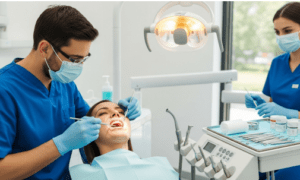Our eyes are indispensable to how we perceive and interact with the world. From appreciating the beauty of a sunrise to navigating the complexities of daily life, our vision is a precious gift that we should protect.
However, in the hustle and bustle of our lives, we often neglect the very organs that allow us to experience the world so vividly. Regular eye check-ups, though seemingly trivial to some, are, in fact, critical for maintaining good eye health and preventing vision loss. Let’s dive into why these check-ups are essential and how they can safeguard your vision for years to come.
Importance of Basic Eye Exams
A basic eye exam typically involves a range of tests to determine your visual acuity, eye muscle function, and overall eye health. During these exams, your eye doctor will use specialised equipment to measure your ability to see clearly at various distances and check for any signs of eye disease or abnormalities. It’s during these exams that any refractive errors, such as nearsightedness, farsightedness, or astigmatism, can be identified and corrected with glasses or contact lenses.
Impact of Impaired Vision
Impaired vision can significantly affect your daily life, making simple tasks like reading, driving, or even recognising faces challenging. It can also hinder your performance well at work or school, impacting your overall productivity and success.
Additionally, the increased risk of accidents due to poor vision can compromise your safety and the safety of others. Ultimately, vision impairment can lead to a reduced sense of independence and a diminished quality of life. That’s where regular eye exams come in, detecting and addressing any vision problems before they escalate and cause irreversible damage.
Eye Exams for Early Detection of Underlying Issues
Furthermore, regular eye exams are instrumental in the early detection and prevention of various eye diseases. Common conditions like glaucoma, cataracts, macular degeneration, and diabetic retinopathy can progress silently, often without any noticeable symptoms in their early stages. By the time vision loss becomes apparent, irreversible damage may have already occurred. However, routine eye examinations can diagnose these conditions early, enabling prompt treatment and significantly reducing the risk of permanent vision impairment.
Recommended Frequency of Eye Exams
The ideal frequency of eye exams varies depending on your age, risk factors, and overall eye health. However, as a general guideline, most ophthalmologists and optometrists recommend having a comprehensive eye exam done every one to two years. This allows for early detection of potential vision problems or eye diseases, ensuring timely treatment and prevention of vision loss.
Protecting Our Vision: A Lifelong Gift
Regular eye check-ups aren’t merely a precautionary measure but an investment in your long-term vision and overall health. Remember, when selecting an eye clinic, it’s best to choose a clinic that provides comprehensive services to ensure complete care for your eyes, such as a clinic like EyeWise Vision, which offers general screening and specialised care for conditions like dry eyes, glaucoma, sports-related eye injuries, diabetic retinopathy, and more.
Your eyes deserve the best care possible, so choose a clinic that will support your vision health journey every step of the way!



































